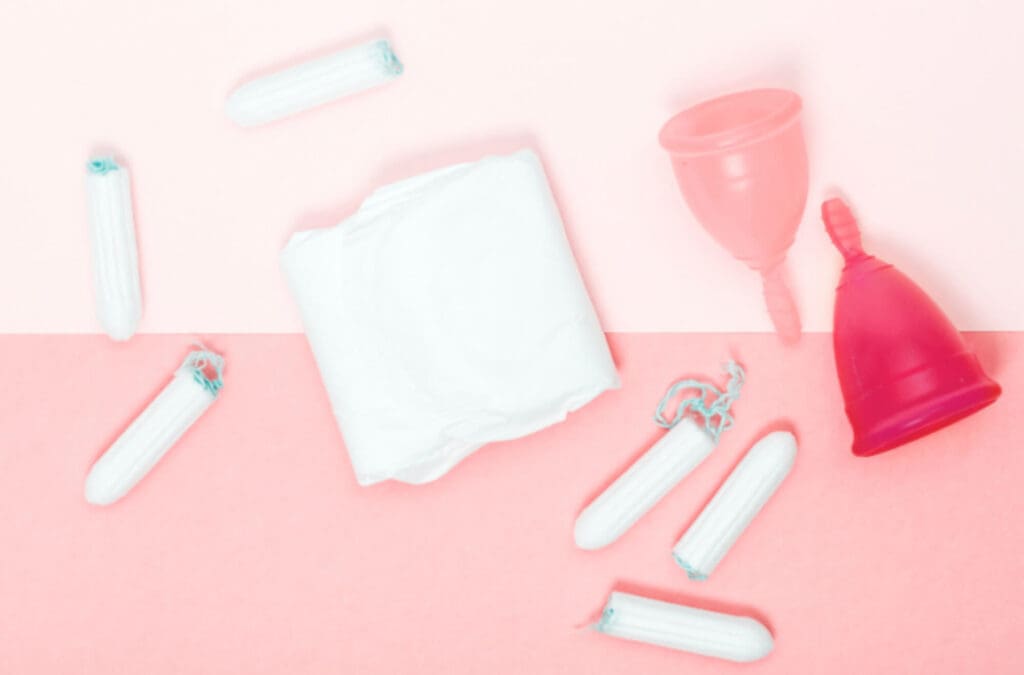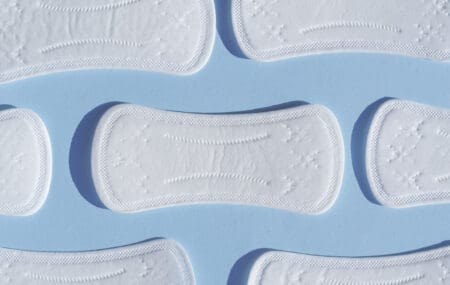
Period Products 101: Questions, Myths, and Misconceptions
Pads, tampons, menstrual cups or period underwear – what is your go-to period product, and why? With so many options to choose from, it’s only natural to have questions or uncertainties. In this blog, we’ll debunk common myths, answer key questions, and explore some pros and cons. In shāʾ Allāh you’ll leave feeling more informed about your menstrual care.
Common period products: An overview
Here are some common menstrual products you can use. For further tips on staying clean and comfortable during your period, be sure to check out our blogs on menstrual hygiene!
Sanitary Pads: Absorbent pads are one of the most widely used period products. They stick to your underwear, and come in various sizes and absorbency levels, depending on your flow.
Tampons: Tampons are inserted into the vagina and absorb menstrual blood internally. They come in different absorbency levels and can have applicators to make insertion easier. Tampons are discreet and a great option for those who prefer not to feel the product during their period.
Menstrual Cups: A small, flexible cup made of medical-grade silicone, which you insert into the vagina to collect menstrual fluid. They can be worn for up to 12 hours, and eco-friendly as they are reusable after cleaning.
Period Underwear: Special underwear designed to absorb menstrual blood without the need for pads or tampons. They are reusable, and come in different absorbency levels. Period underwear is ideal for light to moderate flow days and can serve as a backup for heavier days when you’re using tampons or cups.
Pros and cons
| Product | Pros | Cons |
|---|---|---|
| Pads | Easy to use Disposable and widely accessible Available in various absorbencies No internal insertion required | Can feel bulky Need to change frequently (every 4-6 hours, more often for heavy flow) Can cause skin irritation or discomfort, especially in hot weather Not as environmentally friendly (disposable waste) |
| Tampons | Discreet Can be worn during swimming or physical activities Available in various absorbencies More breathable than pads | Requires internal insertion, which may be uncomfortable for some Risk of Toxic Shock Syndrome (TSS) if not changed regularly Can cause dryness or irritation May not be as eco-friendly (single-use waste) |
| Menstrual Cups | Eco-friendly and reusable Cost-effective over time Holds more blood than pads or tampons Can be worn for up to 12 hours Less risk of leaks if properly inserted | Requires internal insertion Can take time to learn to insert and remove properly Initial cost is higher than pads/tampons Must be sterilised between cycles for hygiene |
| Period Underwear | Reusable and eco-friendly Comfortable and absorbent No need for additional products Good backup for other products on heavy flow days | Can take time to dry after washing Initial cost is higher than disposable options May not be suitable for very heavy flow days without additional protection |
| Menstrual Discs | Can hold more blood than tampons Can be worn for up to 12 hoursLess risk of TSS than tampons | Requires internal insertion Can take time to learn how to insert and remove properly More expensive than tampons or pads (disposable or reusable options available) |
| Reusable Cloth Pads | Eco-friendly and reusable Can be more comfortable than disposable pads No chemicals or synthetic materials Available in different absorbencies | Requires washing after use May feel bulkier than disposable pads Higher initial cost |
Islamic perspective
In Islam, menstruation (ḥayḍ) is recognised as a natural and healthy bodily function. It reflects a sign of the body’s natural rhythm and well-being. Islam places great emphasis on purity (ṭahārah), and menstrual hygiene is an essential part of that. Even during the time of the Prophet ﷺ, women used various methods to maintain cleanliness throughout their menstrual cycles.
Umm Salamah (may Allah be pleased with her) said: “While I was laying with the Prophet ﷺ under a single woollen sheet, I got the menses. I slipped away and put on the clothes for menses…” [Bukhari 298]
However, do note that menstrual products should not cause harm or discomfort. If a product is known to have health risks, it would be discouraged — preserving health is a key Islamic principle. For personalised medical advice, it’s always best to consult a healthcare professional.
When it comes to the permissibility of internal-use menstrual products, there are differing scholarly opinions. We will discuss this in detail in a separate post. If you have concerns about the Islamic perspective on certain products — such as tampons or menstrual cups — you may wish to seek guidance from a trusted Islamic scholar to make an informed decision that fits your body and circumstances.
What are some common misconceptions?
Myth 1: “Tampons can get lost inside your body”
This is a common misconception, but it’s not true! The cervix, located at the top of the vaginal canal, acts as a barrier. It prevents tampons from going anywhere beyond the vagina. If a tampon feels stuck, it can always be gently removed with clean hands, or with help from a healthcare professional if necessary.
Myth 2: “Using menstrual cups can cause infections”
Menstrual cups are safe when used correctly. In fact, they can lower the risk of infections compared to single-use products because they don’t contain synthetic fibres or chemicals. However, like with any product, proper hygiene is essential. Make sure to wash your hands before insertion and removal. Also, clean the cup as instructed by the manufacturer to avoid bacterial growth.
Myth 3: “Menstrual products can affect fertility”
There is no scientific evidence to suggest that using any type of menstrual product has any impact on fertility. Fertility is influenced by many factors, including age, health conditions, and lifestyle. Your menstrual care products aren’t one of them!
Myth 4: “Menstrual products can affect your virginity and make you unchaste”
Virginity is defined by the act of sexual intercourse, not the state of the hymen. The hymen is a thin membrane at the vaginal opening, and it can stretch or tear due to completely non-sexual activities like sports, horseback riding, cycling, or even routine movement. An intact hymen is not a measure of chastity or purity, nor does its presence (or absence) define a woman’s character.
Period products are simply tools for period protection. They do not impact virginity in any way. In fact, Islamic scholars (fuqahāʾ) clarify that if a woman’s hymen is broken for reasons other than sexual intercourse, she is still considered a virgin in Islamic law.
How to choose the right product for you
Selecting the right product depends on your personal preferences, lifestyle, and flow. Here are some factors to consider:
- Flow: If you have a heavy flow, you may prefer super-absorbent pads or tampons, or a high-capacity menstrual cup. On lighter days, thinner pads or tampons might be more comfortable.
- Comfort: Everyone’s body is different. Some may find tampons more comfortable because they’re discreet. While others prefer the ease of pads or menstrual cups. Choose what feels right for you!
- Lifestyle: If you’re active or play sports, tampons or menstrual cups may be more practical since they allow for more freedom of movement. If you prefer a low-maintenance option, period underwear or pads may be the better choice.
- Environmental Impact: Menstrual cups and period underwear are great for those looking to reduce their environmental impact. Since they’re reusable, they generate far less waste compared to single-use pads and tampons.
- Convenience: Disposable products like pads and tampons are convenient. But reusable options require cleaning. Consider what fits best with your daily routine and needs.
Toxic shock syndrome: Should you be concerned?
Toxic Shock Syndrome (TSS) is a rare but serious bacterial infection that has been linked to tampon use, particularly if they are left in for too long. Symptoms of toxic shock syndrome (TSS) can include: a sudden fever, rash (often resembling sunburn), low blood pressure, muscle aches, vomiting, or confusion. These symptoms require immediate medical attention, as TSS is a rare but serious condition.
Although the risk is low, it’s important to follow these guidelines to minimise your chances.
- Change tampons every 4–8 hours.
- Use the lowest absorbency necessary for your flow.
- Wash your hands before inserting or removing tampons.
- Consider switching to pads or menstrual cups overnight to avoid extended tampon use.
Sustainable period products: Are they worth it?
More and more people are making the switch to sustainable period products, for their environmental benefits, their cost-effectiveness and long-term convenience. Unlike disposable pads and tampons, which contribute to landfill waste, reusable options provide a greener, more sustainable way to manage periods.
You can read more about sustainability in our upcoming blog. But in brief:
Menstrual cups are one of the most eco-friendly choices. While they require an initial investment, they can last for years with proper care, making them far more cost-effective in the long run. Similarly, period underwear offers a reusable alternative to single-use products. These can be washed and worn again, and depending on the brand, they can last for several years, making them a practical and sustainable option.
Switching to reusable products may take some getting used to, but for many, the benefits — less waste, fewer expenses, and a more sustainable lifestyle — make it a worthwhile choice. If you’re considering making the switch, it’s all about finding what works best for your comfort, routine, and personal values.
Final thoughts
Menstrual care is personal, and there’s no “one-size-fits-all” solution. What matters most is choosing the product that works best for your body and your lifestyle. Whether it’s pads, tampons, menstrual cups, or period underwear, the key is using them correctly and safely!
Islam encourages cleanliness and self-care, so take the time to explore your options and find what works best for you. Remember, there’s no shame in menstruation — it’s a natural process that Allah has designed for women.
If you ever feel unsure or have concerns about using certain products, don’t hesitate to seek guidance from a trusted scholar or healthcare professional. You deserve to feel supported in managing your menstrual health.

